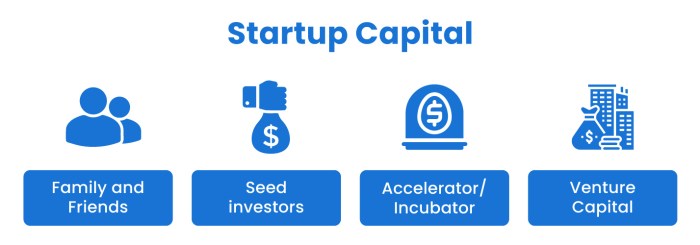Exploring Startup Capital: Essential Guide for New Entrepreneurs
Embark on a journey into the realm of startup capital, a crucial aspect for budding businesses looking to thrive in the competitive market. This introduction sets the stage for a comprehensive exploration of the sources, strategies, and significance of startup capital, providing valuable insights for entrepreneurs seeking to fund their ventures.
As we delve deeper into the intricacies of startup capital, we unravel the complexities and opportunities that come with securing financial resources to turn entrepreneurial dreams into reality.
What is Startup Capital?
Startup capital refers to the initial funding or financial resources that new businesses require to launch and operate successfully. It is essential for covering expenses such as equipment, inventory, marketing, and other operational costs in the early stages of a business.
Importance of Startup Capital
Startup capital is crucial for new businesses as it provides the necessary financial foundation to establish and grow the venture. Without sufficient startup capital, businesses may struggle to cover initial expenses, leading to financial instability and potential failure.
- Allows for the purchase of essential equipment and inventory.
- Enables businesses to invest in marketing and promotional activities to reach target customers.
- Provides a buffer for unexpected expenses or economic downturns.
Sources of Startup Capital
There are various sources from which new businesses can acquire startup capital to kickstart their operations. Some examples include:
- Personal Savings:Many entrepreneurs use their own savings to fund their startup.
- Friends and Family:Some entrepreneurs seek financial support from friends and family members.
- Angel Investors:Angel investors are individuals who provide financial backing for startups in exchange for ownership equity.
- Venture Capital:Venture capital firms invest in high-potential startups in exchange for equity.
- Bank Loans:Entrepreneurs can apply for loans from banks or financial institutions to secure startup capital.
Sources of Startup Capital

When starting a new business, entrepreneurs often need to secure funding to get their venture off the ground. There are various sources of startup capital available, each with its own advantages and disadvantages.
1. Bootstrapping
Bootstrapping refers to the practice of funding a business using personal savings, revenue generated by the business, or other personal resources. This approach allows entrepreneurs to maintain full control over their business but may limit growth opportunities due to limited resources.
2. External Funding
External funding sources include angel investors, venture capitalists, crowdfunding, bank loans, and grants. These sources provide additional capital to fuel growth but often come with strings attached, such as giving up equity or taking on debt.
3. Personal Savings
Using personal savings as startup capital is a common approach for many entrepreneurs. While this allows for complete control over the business and avoids debt or giving up equity, it can be risky as it puts personal finances on the line.
Additionally, relying solely on personal savings may limit the growth potential of the business.
Venture Capital and Angel Investors
Venture capital and angel investors play a significant role in providing startup capital to early-stage businesses. Venture capital firms and angel investors are crucial sources of funding for entrepreneurs looking to grow their startups.
Venture Capital
Venture capital refers to funds provided by investors to startups and small businesses that show high growth potential. These investors, known as venture capitalists, typically take equity stakes in the companies they invest in. Venture capital firms raise money from various sources, such as high-net-worth individuals, pension funds, and institutional investors, to create a fund that is then used to invest in promising startups.
- Venture capital firms usually invest in startups that have the potential for high returns, often in innovative industries like technology, biotech, or e-commerce.
- They provide not only funding but also mentorship, industry connections, and expertise to help startups succeed and grow.
- Venture capitalists take on higher risks compared to traditional lenders, as many startups they invest in may fail, but the ones that succeed can generate substantial profits.
Angel Investors
Angel investors are affluent individuals who provide capital to startups in exchange for equity ownership. They are typically experienced entrepreneurs or business professionals who invest their own money into early-stage companies.
- Angel investors often fill the gap between the initial funding stage (friends and family) and venture capital funding for startups.
- They play a crucial role in supporting startups at the early stages when traditional sources of funding may be scarce.
- Angel investors not only provide financial support but also offer valuable advice, guidance, and industry connections to help startups navigate challenges and grow their businesses.
Crowdfunding and Grants

Crowdfunding and grants are alternative sources of startup capital that can help entrepreneurs kickstart their business ventures. Crowdfunding involves raising funds from a large number of people, typically through online platforms, while grants are non-repayable funds provided by organizations or government entities to support specific projects or initiatives
Crowdfunding as a Source of Startup Capital
Crowdfunding allows entrepreneurs to pitch their business ideas to a wide audience and receive contributions from individuals who believe in their vision. There are different types of crowdfunding platforms, including reward-based crowdfunding (backers receive rewards or products in exchange for their contributions), donation-based crowdfunding (backers donate funds without expecting anything in return), equity crowdfunding (backers receive equity in the company), and debt crowdfunding (backers provide loans to the company).
Types of Crowdfunding Platforms and How They Work
- Reward-Based Crowdfunding: Platforms like Kickstarter and Indiegogo allow entrepreneurs to offer rewards, such as early access to products or exclusive merchandise, to backers who support their campaigns.
- Equity Crowdfunding: Platforms like SeedInvest and Crowdcube enable entrepreneurs to raise funds by selling shares of their company to investors.
- Donation-Based Crowdfunding: Platforms like GoFundMe and Fundly are used for charitable causes or personal projects, where backers contribute funds without expecting any financial return.
- Debt Crowdfunding: Platforms like LendingClub and Funding Circle allow entrepreneurs to borrow money from individual lenders and repay with interest over time.
Applying for Grants as a Form of Startup Capital
Applying for grants involves identifying relevant grant opportunities, preparing a detailed proposal outlining the project or business idea, and submitting the application according to the requirements of the granting organization. Grants can come from various sources, including government agencies, non-profit organizations, and private foundations, and can provide entrepreneurs with the necessary funding to launch or grow their businesses without the burden of repayment.
Business Loans and Lines of Credit
Business loans and lines of credit are common sources of startup capital for entrepreneurs looking to fund their new ventures. While both options provide access to much-needed funds, there are key differences between the two.
Differentiate between Business Loans and Lines of Credit
- Business Loans: Business loans are lump-sum amounts borrowed from a financial institution that must be repaid over a set period of time with interest. These loans are typically used for specific purposes such as purchasing equipment, inventory, or real estate.
- Lines of Credit: A line of credit, on the other hand, is a revolving credit account that allows business owners to borrow funds up to a predetermined limit. They only pay interest on the amount they use and have the flexibility to borrow and repay as needed.
Explain how Startups can Qualify for Business Loans
- Establish a solid business plan: Lenders will want to see a detailed business plan outlining how the funds will be used and how the business will generate revenue to repay the loan.
- Good personal credit score: Startups may need to rely on the founder's personal credit history to qualify for a business loan, so maintaining a good credit score is essential.
- Collateral: Some lenders may require collateral to secure the loan, such as business assets or personal property.
Discuss the Risks and Benefits Associated with Using Loans as Startup Capital
- Risks:
- Debt: Taking on a loan means adding debt to the business, which can be a financial burden, especially if the business struggles to generate revenue.
- Interest payments: Loans come with interest payments, which can add to the overall cost of borrowing and affect the business's cash flow.
- Benefits:
- Immediate access to funds: Business loans provide startups with immediate access to a lump sum of money that can be used to fund operations or growth initiatives.
- Building credit: Successfully repaying a business loan can help establish a positive credit history for the business, making it easier to qualify for future financing.
Importance of Financial Planning
Financial planning is a crucial aspect of securing startup capital as it helps entrepreneurs demonstrate to investors that they have a clear roadmap for utilizing the funds effectively. A well-thought-out financial plan not only instills confidence in potential investors but also ensures that the startup has a solid foundation for sustainable growth.
Tips for Creating a Solid Financial Plan
Creating a solid financial plan involves thorough research, realistic projections, and a clear understanding of the startup's financial needs. Here are some tips to help entrepreneurs develop a compelling financial plan to attract investors:
- Conduct market research to understand the demand for the product or service.
- Artikel all the startup costs, including equipment, inventory, marketing, and operational expenses.
- Develop realistic revenue projections based on market trends and competition analysis.
- Include a detailed budget that accounts for all expenses and potential risks.
- Clearly define the milestones and goals that the startup aims to achieve with the allocated funds.
Role of Financial Projections in Demonstrating the Need for Startup Capital
Financial projections play a crucial role in demonstrating the need for startup capital by providing investors with a clear picture of the startup's growth potential and financial viability. By presenting realistic revenue forecasts, expense estimates, and cash flow projections, entrepreneurs can showcase the scalability and profitability of their business model.
This information helps investors make informed decisions about investing in the startup and highlights the importance of securing adequate capital to support the company's growth trajectory.
Conclusive Thoughts

In conclusion, understanding the diverse avenues of startup capital is key to the success of any new business endeavor. By grasping the fundamentals of funding sources, financial planning, and investor engagement, entrepreneurs can navigate the challenges of startup capital with confidence and strategic acumen.
Commonly Asked Questions
What are the key sources of startup capital?
Startup capital can come from various sources such as personal savings, loans, venture capital, angel investors, crowdfunding, and grants.
How can startups attract investors through financial planning?
By creating a detailed financial plan that showcases market research, revenue projections, and growth strategies, startups can demonstrate their potential to investors.
What are the risks associated with using personal savings as startup capital?
While using personal savings can provide autonomy and flexibility, it puts personal finances at risk and may limit the growth potential of the business.




